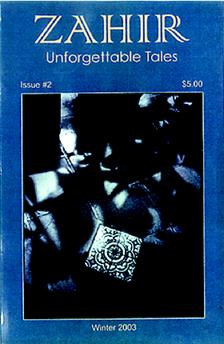There is an unpredictable spectrum of short stories in Zahir, including some polished prose. However, bearing in mind that this is only the second issue, I thought it offered little to hold a candle to Tempchin's own authorial efforts.
In Richard A. Thompson's “The Used Idea Salesman,” rocket scientist Ben Hall drowns his sorrows in a bar near NASA's Ames Research Center. A stiff-talking stranger offers to sell Hall what in the future will be Hall's own idea for revolutionizing space travel, a notion the older Hall will lack the ambition to pursue when he actually comes up with it.
Especially since it's the lead story, I wish I could say that I liked this piece beyond the core idea. With the bar setting, the good Joe down on his luck and the out-of-this-world sales pitch, the structure and trappings for “The Used Idea Salesman” are, frankly, used ideas, strongly evocative of the original Twilight Zone show, which isn't a bad thing, but it comes off as a half-hearted derivation here.
Sharon E. Woods is a graduate of the prestigious Clarion East, and “Iron Truffle Bean Tea” is a nuanced character study in which an angstful melodrama plays out between a truffle farmer and his teenage daughter after the farmer's crops are washed away by a flood. Very polished, but not stimulating in an imaginative sense, which is the point of this kind of fiction.
John B. Rosenman's “A Son in Shadow,” is an alien's-eye-view of silly hoo-mans. While this is a well-worn staple, Rosenman does a fine job, and the uplifting climax involving a terminally ill child just might bring tears to your eyes, as it did mine.
In Laura Taylor Lambros' “Fading,” an elderly man shimmers gradually in and out of existence in the midst of a party. This slice of surrealism was the strongest of the lot for my tastes, as it effectively suspends disbelief with its proposed alternate reality.
Stephen D. Rogers' “The Future is Now” involves a futuristic throwback who still enjoys reading his grandfather's old science fiction stories on paper, in love with a girl who doesn't know he exists. I challenge anyone from this space-time continuum to consider Rogers' frequent experimental phrases as anything more than the emperor's new prose.
I believe Zahir will find its legs to great effect when a broader range of writers discover it. Tempchin, after all, is at the helm, and the course she's charting is much-needed: literary-quality stories that transcend the mediocrity dominating entertainment today, speculative fiction not excepted.









